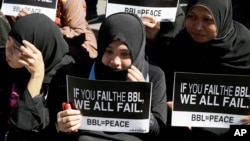Last month, a police raid in the southern Philippines targeting two internationally-wanted terrorists ended in disaster when clashes left about 70 people dead, including 44 police officers. Philippine lawmakers are now holding inquiries into the raid and suspending work on a landmark peace agreement for a self-governing area in the country’s Muslim-majority south.
Lawmakers this week were supposed to be deliberating the merits of a proposed Bangsamoro Basic Law (BBL), which is based on an agreement signed last March between the government and the rebel Moro Islamic Liberation Front.
Instead, those talks have been indefinitely suspended while lawmakers investigate the 12-hour gun battle which took place in Mamasapano town, a marshland area on rebel turf. It was the first time in three years the cease-fire between both sides was broken. Although the raid succeeded in killing Malaysian bomb maker Zulkifli bin Hir, also known as Marwan, a militant on the FBI’s most wanted terrorists list, the execution-style killings of several police officers have enraged the public.
The congressional investigative sessions have been tense and highly emotional with lawmakers pressing for answers about the January 25 operation. Senator Ferdinand Marcos Jr. said lawmakers will not pick up deliberations on the proposed peace law known as the BBL until they finish investigating the deadly police raid.
“We had pinned our hopes on the BBL as bringing peace to Muslim Mindanao. It would seem that now the lesson that we learned is that that may not be sufficient. That maybe there are elements that we have to examine,” said Marcos.
Marcos now calls the proposed law just “one part” of what could lead to peace in the restive region. And he added that its passage by the March 20 session recess would not happen.
Since the January raid, Marcos and other lawmakers have raised questions about the peace agreement’s plan for local law enforcement and national defense.
The government’s chief peace negotiator, Miriam Coronel-Ferrer, said that could lead to changes in the deal that fall short of what was discussed in the original proposal between rebels and government negotiators.
“Even more worse is that we will have a law that is very, very far from the expressed aspirations that are already embodied in the draft, or let’s say, bottom line, the aspirations that are embodied in the Comprehensive Agreement on the Bangsamoro,” said Ferrer.
The comprehensive agreement is the product of nearly 20 years of talks and is meant to end four decades of fighting that has left more than 120,000 dead. The rebels say it addresses their aspiration for self-determination.
But following the deadly police raid, there may be public pressure to scale back the provisions of the proposed law.
Ferrer said she prefers no law to a watered down one. Her counterpart in the MILF, chief peace negotiator Mohagher Iqbal, said in a text message to VOA that his group is still backing the original law but will “see what happens” after it is debated by Philippine lawmakers.
In his opening statement before a senate panel Thursday, Iqbal enumerated the several components of the peace pact that were signed by both sides and made a heartfelt plea for peace.
“It contains our hopes and dreams, if not for us, for our children. We have waited for this opportunity for 17 years. We promised our people that peace will be our legacy. We seek your help in making this promise possible,” said Iqbal.
Ramon Casiple, head of the Manila-based Institute for Political and Electoral Reform, said public trust in the peace process is now shaky. He said that loss of trust could lead to significant changes in the final law.
“The reading there among legislators [is they] would rather risk a war if the MILF wants that or an extended peace process extending to the next administration rather than approve an arrangement, which does not have the trust of the body politic,” said Casiple.
Casiple called the situation a “slow-burning fuse” and that scenarios for the future are “wide open.” He said “it will take time to calm things down.”




